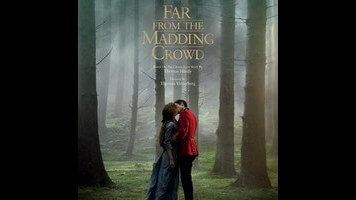Carey Mulligan, hair worn in chestnut curls and voice set a little lower than usual, plays Bathsheba Everdene as a flint: hard, sharp, but able to spark or flake when struck from the right angle. If there’s one thing Far From The Madding Crowd gets right, it’s this aspect of her character, even as it struggles, like so many Thomas Hardy adaptations before it, to find a purpose for itself beyond “widescreen study guide.” Picturesque and impersonal, it evacuates incident upon incident, as though Hardy’s plotting were the runs.
Unfortunately, director Thomas Vinterberg (The Celebration, The Hunt) seems bent on doing his best impression of a stolid BBC veteran on assignment. What that means, generally speaking, is good acting, nice costumes, and camerawork that’s chiefly concerned with making both look interesting. It’s only in those moments when Vinterberg empties the broad, flat widescreen frame and uses it to paint sloping, grassy landscapes that he betrays a glimmer of personal investment. Ironically, these are the moments that feel truest to Hardy’s fiction.
Though the novel is set in South Wessex, a corner of Hardy’s “partly real” English countryside, Far From The Madding Crowd shifts the action to its real-life model, Dorset. (However, Hardy’s fictional place names—Casterbridge for Dorchester, Weatherbury for Puddletown, and so on—are retained.) It’s 1870, and Bathsheba—“Miss Everdene” to just about everyone—is a well-educated woman of modest means. Her neighbor, Mr. Gabriel Oak (Matthias Schoenaerts), proposes marriage, which she rejects for very sensible reasons. When they meet again, it is as employer and employee, she having inherited a large property, he having been ruined by the loss of his livestock. On the most basic level, Hardy’s novel is about two people getting to know and trust each other very slowly, while everything around them changes dramatically. Far From The Madding Crowd can’t seem to work on that basic level; its central relationship—a love story—seems frozen in time, while everything around it moves in sudden jerks.
Vinterberg, who co-founded the Dogme 95 movement with Lars Von Trier, has had an uneven career, but he’s always seemed at ease with actors. Madding’s strength is in its cast: Mulligan, Schoenaerts, Michael Sheen, and possibly Tom Sturridge, whose mannequin-like performance as Sergeant Troy toes the line between being completely credible and very bad. Sheen, playing Mr. Boldwood, the fortyish bachelor who persistently courts Bathsheba, is all flop sweat and fidgeting; he’s pitiful, and sometimes downright painful to watch. He’s not Hardy’s Boldwood, but he’s a Boldwood. The only sad, genuine moment of the film belongs to him.
Which raises the question: How does a good-looking movie, based on a very good book, with a fairly good cast, end up not being all that good? It would be easy to pin the blame on Nicholls’ script, which matches every clever new idea—like having Bathsheba sing the traditional folk ballad “The Sprig Of Thyme” to a dinner audience that includes Boldwood and Mr. Oak, her two suitors—with two very corny ones. Compressing the source material squeezes out its psychology and its emotion, turning tragedies into meaningless twists and arcs into plunges. The truth, though, is that a director can create a space where it’s needed.


 Keep scrolling for more great stories from A.V. Club.
Keep scrolling for more great stories from A.V. Club.